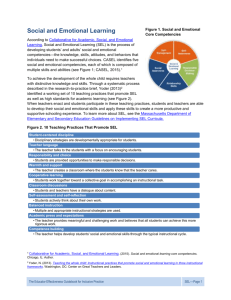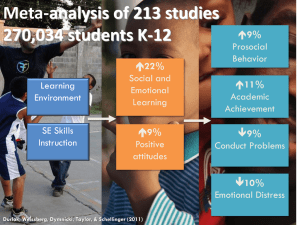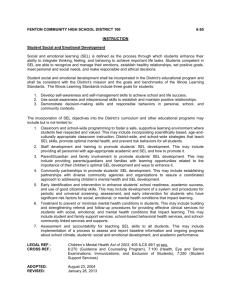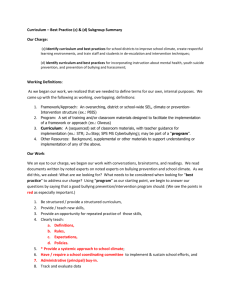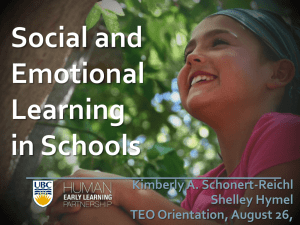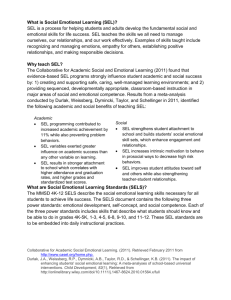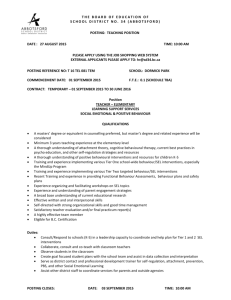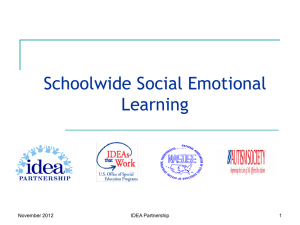Read now - The Inner Resilience Program
advertisement
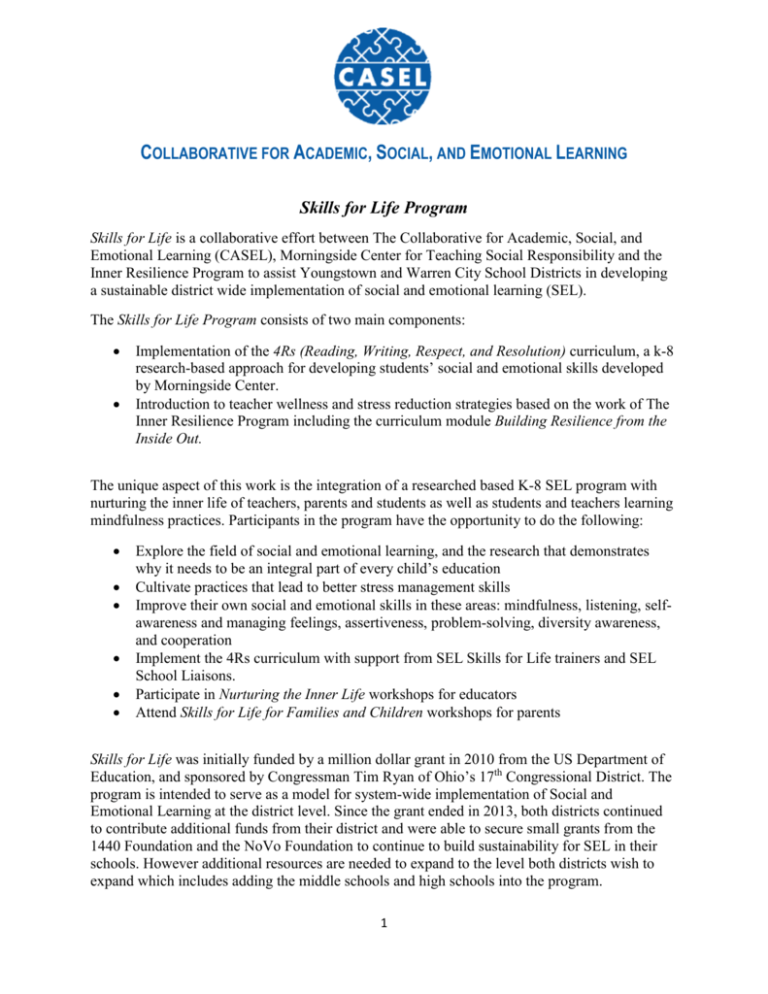
COLLABORATIVE FOR ACADEMIC, SOCIAL, AND EMOTIONAL LEARNING Skills for Life Program Skills for Life is a collaborative effort between The Collaborative for Academic, Social, and Emotional Learning (CASEL), Morningside Center for Teaching Social Responsibility and the Inner Resilience Program to assist Youngstown and Warren City School Districts in developing a sustainable district wide implementation of social and emotional learning (SEL). The Skills for Life Program consists of two main components: Implementation of the 4Rs (Reading, Writing, Respect, and Resolution) curriculum, a k-8 research-based approach for developing students’ social and emotional skills developed by Morningside Center. Introduction to teacher wellness and stress reduction strategies based on the work of The Inner Resilience Program including the curriculum module Building Resilience from the Inside Out. The unique aspect of this work is the integration of a researched based K-8 SEL program with nurturing the inner life of teachers, parents and students as well as students and teachers learning mindfulness practices. Participants in the program have the opportunity to do the following: Explore the field of social and emotional learning, and the research that demonstrates why it needs to be an integral part of every child’s education Cultivate practices that lead to better stress management skills Improve their own social and emotional skills in these areas: mindfulness, listening, selfawareness and managing feelings, assertiveness, problem-solving, diversity awareness, and cooperation Implement the 4Rs curriculum with support from SEL Skills for Life trainers and SEL School Liaisons. Participate in Nurturing the Inner Life workshops for educators Attend Skills for Life for Families and Children workshops for parents Skills for Life was initially funded by a million dollar grant in 2010 from the US Department of Education, and sponsored by Congressman Tim Ryan of Ohio’s 17th Congressional District. The program is intended to serve as a model for system-wide implementation of Social and Emotional Learning at the district level. Since the grant ended in 2013, both districts continued to contribute additional funds from their district and were able to secure small grants from the 1440 Foundation and the NoVo Foundation to continue to build sustainability for SEL in their schools. However additional resources are needed to expand to the level both districts wish to expand which includes adding the middle schools and high schools into the program. 1 The American Institutes for Research (AIR) conducted an implementation and outcome evaluation of the SFL program. The evaluation used both quantitative and qualitative data collection methods to gather information from participants in each district. Quantitative analyses included paired-sample t-tests to determine whether differences in the pretraining and end-ofyear survey responses were significant and training evaluation mean scores were also calculated to determine participants’ level of satisfaction with the training. Focus groups and interviews were conducted and these data along with open-ended responses from the online surveys and training evaluation forms were coded and examined for themes and responses across participant groups. The Skills for Life Program was implemented in 11 schools across the two districts (7 in Youngstown, 4 in Warren). The total participants served through June 2012 include 240 teachers and school staff, 28 school administrators, 15 district administrators, 4,997 students and 294 parents. This number continues to grow due to sustainability efforts being made beyond the duration of the grant period. Key findings include: Participants demonstrated statistically significant improvement in their knowledge of training topics after one year of implementation (Cohort 1: n=34; Cohort 2: n=29). The greatest gains in knowledge occurred in topics related to improving social emotional competencies. Participants significantly increased their social and emotional learning efficacy and became more mindful about their interactions with students, suggesting an overall increase in competence (Cohort 1: n=19; Cohort 2: n=24). Cohort 2 (n=24) participants reported statistically significant change in their classroom behavior management efficacy after the first year of implementation. Participants in both cohorts reported positive changes in student behavior and in their classroom climate. Overall the Skills for Life Program succeeded in: increasing staff knowledge about the role SEL plays in the schools. encouraging weekly implementation of the SFL approach. establishing systems such as SEL School Steering Committees within the schools to continue to sustain this work. Throughout and beyond the grant period, the SFL team has worked at the district level to increase buy-in and improve the conditions by which sustainability of the SFL program can occur. These efforts have resulted in a modified version of the program continuing in both districts beyond the end of the grant period using each school district’s resources from their general funds. This development in both districts demonstrates the confidence they continue to have in the SFL Program and the role it continues to play in the systemic implementation of SEL in their districts. 2 Despite significant pressure to improve students’ academic achievement and competing priorities, both districts have retained their focus on implementing the SFL curriculum and have been successfully supported by the SEL School Steering Committees. Overall there is evidence of efforts in both districts to promote school-wide SEL practices. In addition, by engaging in ongoing dialogue with school and district administrators, SEL has remained at the forefront. SEL District Liaisons continue to be a key source of support for school staff and a strong foundation on which they can continue this work. Results from the evaluation indicated that participants found group professional development opportunities in the various afterschool workshops very helpful. Participants appreciated the opportunity to expand on specific strategies and techniques, learn about what other teachers were doing, share successes and challenges and receive immediate support from peers in reinforcing self-care strategies. Some participants commented: “They gave me the support I needed to continue on the path of social emotional learning for my students.” “They helped to decrease my frustration with the lack of support at the building level and gave me people to share positive experiences with, that I did not have at my building level.” “I thought the afterschool workshops were extremely informative and meaningful.” In addition, staff spoke very positively about the individual professional development in the form of in-person coaching sessions. Staff appreciated feedback and consistently expressed the need for additional coaching and support. Participants significantly increased their social and emotional efficacy and became more mindful about their interactions with students suggesting an overall increase in SEL competence. By providing comprehensive training on SEL and how to implement the program, the SFL team succeeded in increasing participant knowledge and capacity to implement the SFL curriculum and participants increased their perceptions of the positive relationship between SEL and academic achievement. Post training evaluations also revealed that all principals were satisfied with the training and that the training increased their knowledge of how to begin school-wide planning to generate buy-in for SEL. The Skills for Life Program is currently directed by Linda Lantieri, Senior Program Advisor for the Collaborative for Academic, Social and Emotional Learning (CASEL) and Tom Roderick, Executive Director of the Morningside Center for Teaching Social Responsibility. There are also local district coordinators that administer the program at the district level. For more information contact Linda Lantieri at llantieri@att.net or 212 509-0022 Ext. 229. 3
